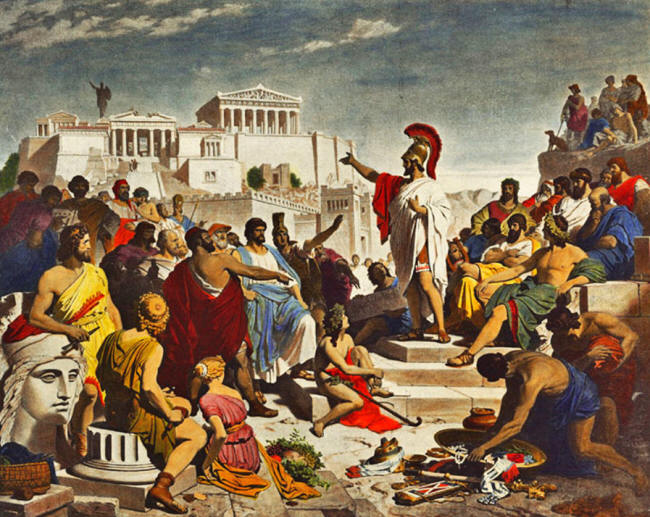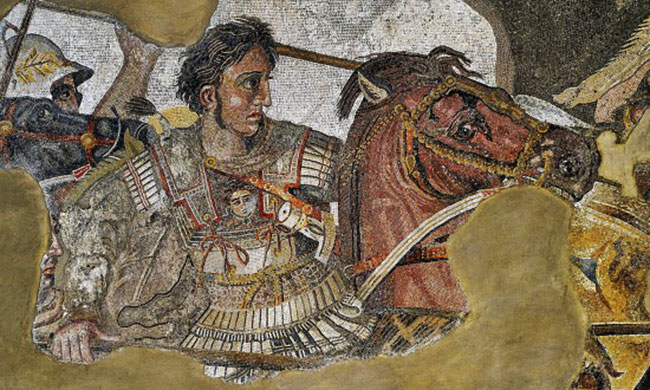|
April 29, 2016
It has long been the prerogative of the 'young' to consider that phrases such as,
...as something particularly apposite to the prevailing geopolitical climate.
However, for those of us who annually accrue more grey hairs than new CDs (or, indeed, who think CDs can still be used in a contemporary analogy), we tend to be able to take a step back, pause, reflect, and realize that, as messed up as things may seem on any given day, history is one long litany of the trials and tribulations, of the ebbs and flows of the freedom of mankind.
Wrong in the sense that history is not an ever-oscillating shuffle-board of liberty; indeed, we can almost identify a moment at which (in the Classical, European tradition) 'freedom' was created!
However, and despite the fanciful feats of Moses, the concept of 'political freedom' in terms of a personal liberty under a law recognized by the state, took some time to develop.
Though women had differing roles and levels of importance in the various societies of antiquity, it is fair to say, broadly speaking, that they were not politically enfranchised - though they may have enjoyed some protection under the law, their freedom was usually dependent on that of their husband/father.
Thus, for the purposes of this article, it shall be assumed we are talking about 'free, adult males' unless specifically stated otherwise.
Indeed, the high ideals of Athens' Golden Age (the fifth century BC), was very likely influenced by her political system rather than, as some contest, what produced it.
Whilst words like eleutheros and liber appear in the most ancient sources, it is not until the Greeks began to fear for their liberty vis-à-vis Persia (particularly with the war of 480/479BC) that the abstract noun eleutheria came into the vocabulary.
Indeed, eleutheria seemed, initially at least, to be intrinsically tied to the idea of being a tyrant-free zone.
The irony being that Athens, after forming this coalition of Greek states, soon started to play fast and loose with the freedoms of the very countrymen whom they had vowed to protect.
"…history is not an ever-oscillating shuffle-board of liberty; indeed, we can almost identify a moment at which (in the Classical, European tradition) 'freedom' was created!"
Indeed, this was a key propaganda tool used by fellow-Greeks, Sparta, during the Peloponnesian War (431-404BC), who railed against the polis tyrannos of Athens - only, all too predictably, to themselves become oppressive to the Greek states which fell under their 'protection'.
However, all this was done in the shadow of the Perians who remained a constant threat to 'Greek freedom' until Alexander the Great finally 'liberated' Hellas from its Eastern oppressors, albeit only after Greece had been assimilated into the Macedonian Empire.
Alexander the Great
The struggle as to whom they should call master was finally ended in 196BC by Flamininus, the Roman general in charge of Greek affairs at the time, when he dramatically announced at the Isthmian Games (a festival only slightly less important than the Olympics) that Greece was now a free state - though Roman legions would stay in the country for another few years and Greece never again had the military or political clout to consider themselves truly independent of Rome.
Though abolitionism was never seriously on the cards, many theories were put forward to condemn or justify it (Aristotle's thoughts on the subject in his Politics make particularly uncomfortable reading).
However, Plato seemed contemptuous of such ideas, highlighting their potential excesses in The Republic.
Though the Cynics had much to say on the issue and on happiness in general, it was the Stoics and Epicureans who believed in freedom as humanity's principle raison d'être.
The failure to do this resulted, during the imperial age, to a de facto regression to the pre-classical idea of freedom i.e. security before the law, but an almost complete lack of political rights.
Christianity didn't care about background, education, influence or even if one were free or enslaved; all who prostrated themselves before their god were equally free (or, if you're so inclined, equally enslaved).
Christ could liberate from social status, from sin, and even from death...!
did not oppose slavery as an institution, but in accepting slaves into their community they anticipated the universal brotherhood
of the free
expected in another world"
Even if we hold fifth century Athens up as an champion to such causes, we still have to face the reality that, not only were women a negligible force, but society only functioned because of a vast underclass of slaves.
What seems to be the clearest take-away from these early forays into the world of the free is that freedom is a process, one that still is barely existent in many dark corners of the world and one which may not yet have been perfected anywhere.
"…there are signs, here and there, of the green shoots of liberty: justice before the law, the right to vote, freedom from tyrants, freedom from invasion, ideas on what it takes to be free and at peace within one's own body and mind."
On which note, I'll leave you not with my own thoughts, but with those of a couple of men who knew a thing or two about the struggle to achieve freedom, its power over the human race, and the constant fight necessary to maintain it:
|



